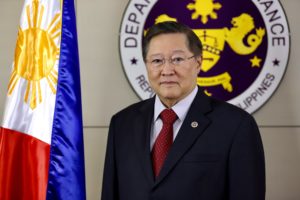House ways and means committee chair and Albay Rep. Joey Salceda is pushing to slap a franchise tax on “e-sabong” to institutionalize cockfighting, an industry which is currently informal hence generating “suboptimal” revenues for the government.
In a presentation, Salceda said slapping a 5-percent franchise tax based on gross gaming receipts, net of agents’ commissions, coupled with shifting to digital betting would allow transparency while shoring up the government’s tax revenue collection.
Salceda noted that at present, the state-run Philippine Amusement and Gaming Corp. (Pagcor) charges e-sabong operations with a regulatory fee amounting to only P12,500 per fight or P75 million a month, whichever was higher.
‘Gray area’
“Pagcor subjects the industry to coverage of Anti-Money Laundering Act for casinos, despite no explicit implementing rule to this effect … agents and operators already work with BIR (the Bureau of Internal Revenue) to meet obligations despite lack of clear tax framework,” Salceda said.
It did not help that a “gray area” in the Local Government Code which allowed cities and municipalities to authorize and license cockfighting did not cover the recent emergence of electronic betting.
“These activities also do not explicitly fall within the explicit purview of the government gaming agencies, such as Pagcor or the Philippine Charity and Sweepstakes Office,” Salceda added.
According to Salceda, “the informality of physical cockfights [along with the lack of receipts for bets made in such games] yields suboptimal revenues for the national government.”
Salceda noted that in 2019, the BIR collected only P13.7 million in taxes from the 18-percent tax on receipts from cockpits, even as the Games and Amusements Board had estimated the onsite cockfighting industry to be worth P50 billion yearly.
As such, Salceda said “the shift to digitalized transactions and betting, along with prohibitions on physical gatherings, allows the national government the opportunity to establish a more accountable and transparent system.”
Regulations
Salceda defined the proposed gross gaming receipts as “all the receipts, including income derived from ‘plasada’ or net commission from activities, net of agents’ commissions and marketing expenses authorized by this franchise.”
“Revenues shall be directly remitted to the BIR. Tax shall not be in lieu of local government taxes and regulatory fees and charges applicable to such activities. Activities not included in the scope of the franchise shall be taxed at regular rates or rates applicable to those activities. Agents are not covered by the 5-percent tax rate,” Salceda said.
Under Salceda’s proposal, the e-sabong franchise regime will be in place for 25 years, including a five-year “sandbox” period so that Pagcor—as the proposed principal regulatory agency—and the BIR could still polish regulations before authorizing new franchises.
Salceda said franchises would be authorized to conduct off-site or online betting anywhere in the country even as sites and fights have to be first approved by local government units in order to be consistent with the Local Government Code.
“The proposed regime is consistent with the House-approved proposal for e-sabong tax, which has received no objection from the Department of Finance,” according to Salceda.


